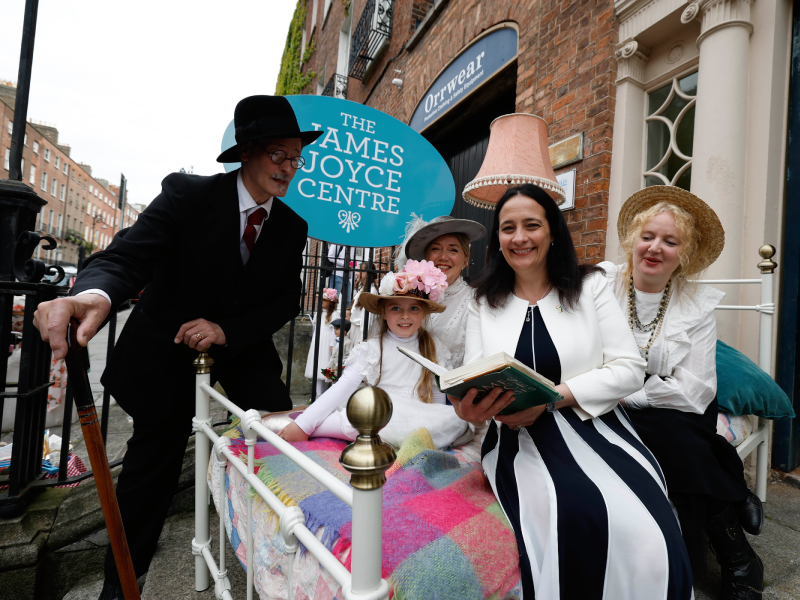The Museum of Childhood Ireland and Marsh’s Library proudly presents its annual Bloomsday Writing Competition for Young Authors! We invite young authors to write a short piece of fiction inspired by Ulysses.
Please read on to learn about what’s involved, what to write, and how to submit an entry. Whether the author is a primary school pupil or a second level student, these core rules apply:
-Deadline is June 1st 2024 at 9am and the author must be under 18 on that date.
-Entries must not exceed 500 words, and cannot include defamatory, distressing, or inappropriate content.
-The story must be based where the young writer is currently living or recently lived, but set 100 years into the future.
-Each entry should only include the writer’s first name, age, and approximate location (county in Ireland / country if outside Ireland). Contact details for a responsible adult are collected separately.
Primary school pupils
James Joyce was an Irish writer who wrote a very famous book called Ulysses. In it, he describes a day in the life of three main characters, living in Dublin over 100 years ago. Think of where you live right now. What might it have been like 100 years ago? Would it be very different? Now, think 100 years into the future. In 2124, what do you think life will be like where YOU live? What will people be like and what will the area be like? Now, write a story about one day in the life of one character (it can be you or someone else), and base it where you live. Tell us what it is like in 2124, what has changed in people’s lives and what has stayed the same.
Second level students
James Joyce was an Irish writer who wrote a very famous novel called Ulysses. The story takes place over a single day, June 16th, 1904. It follows the activities of three main characters, who offer a unique perspective on the changes happening in Dublin at that time. Often people say that Dublin is the fourth character, because Joyce weaves the city’s streets, landmarks, and cultural nuances into the fabric of the story. Ulysses captures the essence of early 20th century Dublin, a city emerging from cultural and political unrest, and gives a snapshot of this time. You are asked to create a story that reflects and pays homage to Joyce’s ability to capture social, political and cultural changes, but is based in the future (2124). It must include three main characters, each offering a unique perspective on where you live, as you think it will be in 100 years from now. If you use artificial intelligence (AI) as part of the creative process, you must indicate how it has been used and explain how you have put your own unique, personal and creative stamp/angle of this story to make it an original entry.
How to submit entries
Young authors cannot submit their own work. Entries must be emailed on their behalf by a teacher or responsible adult, with appropriate parental permission. Do not include the entries in the main body of the email. Send them as an attached file (e.g., a Word document or PDF) to eeivers@museumofchildhood.ie.
Each attached file must include the story itself, the writer’s first name, age and their location (county or country). It should not include any other identification information. In the email itself, the adult submitting must confirm that the story is original, it is the work of the author, and it is based where the author currently lives or previously lived. The adult must provide their own contact and personal details. If you are a teacher submitting on behalf of one or more pupils or students, you only need to confirm originality once, for all entries submitted. Please also include your school name and roll number. This information will be used to identify prize-winning schools.
Awards Ceremony: Marsh’s Library in September, specific date TBC.
The winners will be announced on Bloomsday, June 16th on our website, but the ceremony will be in September.
Prizes: For the primary school level winner, second level winner, and their associated schools. We will also have one overall winner. Shortlisted finalists will receive certificates.
Sponsors: Experience Glasnevin, Gill Books, Faber-Castell, Futa Fata, The O’Brien Press.
Winning writers will be able to select a set of books from our sponsors’ websites. They will also receive a set of Faber-Castell materials, and Experience Glasnevin are offering a family pass to visit and tour / something from their gift shop.
The schools associated with the winning writers will receive sets of books from our sponsors, materials from Faber-Castell, and a class tour with Experience Glasnevin.
Full terms and conditions of the competition: https://museumofchildhood.ie/writing-art-project-2020-terms-and-conditions/
Governance: https://museumofchildhood.ie/governance/






